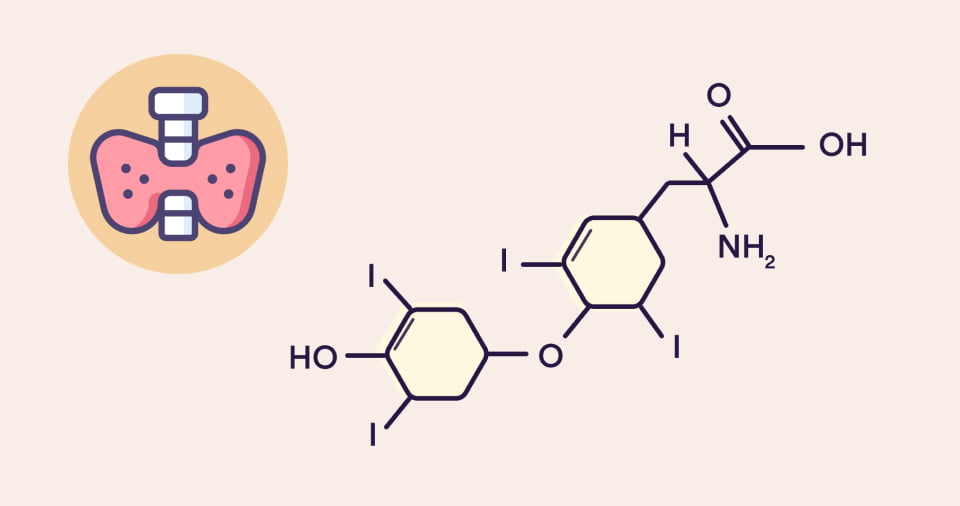Your thyroid creates hormones that play a variety of different roles within the body. The thyroid can create too much or too little hormones resulting in thyroid disease such as hyperthyroidism, hypothyroidism, thyroiditis, and Hashimoto’s disease.
What is the thyroid?
The thyroid is a small gland located at the front of the neck, right above the collar bone. It wraps around the windpipe (trachea) in the shape of a butterfly. You have glands throughout your body that talk to each other via hormones. The hormones that the thyroid is responsible for play a huge role in the metabolism. That is why most people with low thyroid hormone typically have less energy.
The thyroid produces two specific hormones – T4 (thyroxine) and T3 (triiodothyronine). These two hormones are regulated by the pituitary gland. The pituitary gland releases a hormone call thyroid stimulating hormone or TSH, like the name it does just that. When the pituitary gland senses low thyroid hormones, it will send an amount of TSH to tell the thyroid to make more. The glands work in tandem to ensure proper hormones are produced. But sometimes that process goes a little haywire.
Thyroid Disease
Thyroid disease is an umbrella term for a medical condition that results in abnormal hormone levels. Two of the most common thyroid diseases are:
- Hyperthyroidism – the thyroid makes too much hormone resulting in using energy too quickly. Symptoms are fatigue, muscle weakness, rapid heartbeat, weight loss, nervousness.
- Hypothyroidism – the thyroid doesn’t make enough hormone. So you lack energy, feel tired, inability to tolerate the cold, and weight gain.
These disorders can be secondary to a primary disease such as Hashimoto’s or Grave’s disease or simply be genetic. Thyroid disease can affect anyone, sometimes it presents itself early on or later in life. It is important to know how it is diagnosed and what the symptoms are.
How is thyroid disease diagnosed?
Primary tests include blood test, imaging of the thyroid, and physical signs & palpation. Imaging can determine textures, lumps, or defects that can be indicative of a thyroid disease. Physical signs and symptoms can be generic but sometimes can be predicted by the way they present themselves. A physician may manually feel the thyroid to detect lumps or enlargement. The most definitive test is blood work to identify that there is something wrong and their needs to be additional testing.
Thyroid panel may include some or all the following.
- Thyroid stimulating hormone (TSH): If TSH level are abnormal, then there is a problem with the feedback loop that TSH has on the thyroid hormones. For example, in hypothyroidism, a person will have elevated TSH to encourage the thyroid to produce more hormones and vice versa for hyperthyroidism. Normal levels: 0.40-4.50 mIU/mL
- Thyroxine (T4): T4 is the inactive form of the thyroid hormone and most tested. T4 is directly triggered by TSH. Low T4 is related to hypothyroidism and high T4 is related to hyperthyroidism. Normal range: 5.0-11.0 ug/dL
- Free T4: a method of measuring unbound T4 which could prevent accurate measurements. Normal range: 0.9-1.7 ng/dL
- Triiodothyronine T3: This can further detect the severity of hyperthyroidism and hypothyroidism. T3 is the active form. Normal Range: 100-200ng/dL
- Free T3: a method of measuring unbound T4 which could prevent accurate measurements. Normal range: 2.3-4.1 pg/dL
Additional blood test:
- Thyroid antibodies: these are used to identify autoimmune disorders of the thyroid. High antibodies indicate the body is attaching the thyroid.
- Thyroglobulin: indicative of inflammation of the thyroid and used to determine thyroiditis and thyroid cancer.
Recommendations to Maintain Healthy Thyroid
There are no specific recommendations in order to maintain a healthy thyroid outside of general health recommendations. You still want to eat a variety of fruits, vegetables, nuts, and whole-grain food. Consume lean protein and healthy fats. The root cause of thyroid disorders are either genetic or there are some studies that suggest things like metal toxicity, poor diet, etc. Nothing is definitive.
But something I do recommend is getting a baseline of your thyroid levels when you are healthy. Even though there are normal ranges, there is the consideration that something may be high or low for you but still within normal range. It is important to have an understanding of your normal so that when start to feel off, you can potentially identify the problem despite values being in normal ranges.
